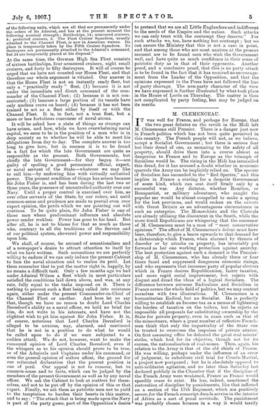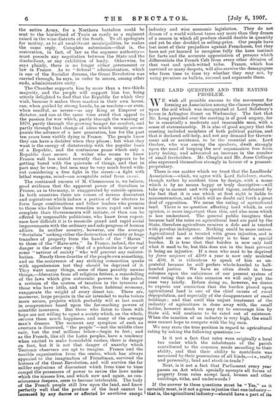M. CLEMENCEAIT.
IT was well for France, and perhaps for Europe, that the two great debates on the revolt in the Midi left M. Clemenceau still Premier. There is a danger just now in French politics which has not been quite perceived in this country. The French people will not, as we believe, accept a Socialist Government ; but there is serious fear lest their dread of one, as menacing to the safety of all property, should drive them into a course almost as dangerous to France and to Europe as the triumph of Socialism would be. The rising in the Midi has intensified this dread, for it has aroused a doubt whether in economic quarrels the Army can be implicitly relied on. The spectre of Socialism has succeeded to the "Red Spectre," and this implies in France a craving for a despotic Government of some kind, which can seat itself firmly only by a successful war. Any dictator, whether Bourbon, or Bonapartist, or military adventurer, who caught the popular ear would be almost compelled to make a spring for the lost provinces, and would reckon on the entente with Great Britain as an advantageous circumstance in such an enterprise. The Monarchists and the Clericals are already utilising the discontent in the South, while the more timid Republicans are whispering that the successor of M. Clemenceau must be a man of "most conservative opinions." The effect of M. Clemenceau's defeat must have been, therefore, to give a. heave upwards to that demand for a dictatorship which France, when alarmed by threats of disorder or by attacks on property, has invariably put forward as her one working protection against anarchy. The best protection against such a demand is the Premier- ship of M. Clemenceau, who has already three or four times faced and suppressed dangerous economic risings, and who represents that immense party of popular electors which in France desires Republicanism, fairer taxation, and more rapid social improvement, but rejects with disgust and dread the ideas of a logical Socialism. The difference between extreme Radicalism and Socialism in France covers the whole field of politics, but we may content ourselves with two illustrations. M. Clemenceau is a humanitarian Radical, but no Socialist. He is perfectly willing to establish an Income-tax as a means of lightening the burden of taxation on the toilers, but he rejects as impossible all proposals for substituting ownership by the State for private property, even in cases such as that of the mineowners, where a great number of reflective French- men think that only the impartiality of the State can be trusted to overcome the impulses of private avarice. On first assuming office he defeated the great coal millers' strike, which. had for its objective, though not for its excuse, the nationalisation of coal-mines. Then, again, his relation to the Army is that of the old chiefs of France. He was willing, perhaps under the influence of an error of judgment, to substitute civil trial for Courts-Martial, a project now postponed ; but he is absolutely opposed to anti-militarist agitation, and no later than Saturday last declared publicly in the Chamber that if the discipline of the French Army were weakened, France as France would speedily cease to exist. He has, indeed, sanctioned the restoration of discipline by punishments, like that inflicted on a section of the 17th Regiment, which are positively severe, for the French conscript dreads service in the interior of Africa as a sort of penal servitude. The punishment was probably chosen because in a, way it would terrify the entire Army, for a Northern battalion could be sent to the hinterland of Tunis as easily as a regiment raised in the wine districts of the South. To all apologists for mutiny, as to all recalcitrant municipalities, he makes the same reply. Complete submission—that is, the restoration, in fact, of law as the supreme authority— must precede any negotiation between the State and the disobedient, or any exhibition of ]enity. Otherwise, he says plainly, there is no longer either government or law in France. As to " federal " administration, which is one of the Socialist dreams, the Great Revolution was carried through, he says, in order to secure, among other ends, administrative unity.
The Chamber supports him by more than a two-thirds majority, and the people will support him too, being utterly delighted to find that the Republic for which they wish, because it makes them masters in their own house, can, when guided by strong hands, be as resolute—or even, when needful, as severe—as any King or Emperor or dictator, and can at the same time avoid that appeal to the passion for war which, partly through the warning of 1870, partly through the growing hunger for comfort, and partly through that change of ideas which usually accom- panies the advance of a new generation, has for the past ten years been visibly dying in France. The people know they can have a dictator when they please ; but what they want is the energy of dictatorship with the popular basis of a Republic, and the continuous peace which only a Republic dare secure. A writer who seems to know France well has stated recently that she appears to be getting bored with the quietude of things, and that in part may be true; but men may be very much bored with- out considering a free fight in the street—a fight with lethal weapons, mind—an acceptable relief from ennui.
The continued success of M. Clemenc,eau is, we believe, good evidence that the apparent power of Socialism in France, as in Germany, is exaggerated by outside opinion.
In both countries there are causes of serious discontent and aspirations which induce a portion of the electors to form large combinations and follow leaders who promise to those who follow them remedies more rapid and more complete than Governments will initiate, or than can be offered by responsible politicians, who know from experi- ence how difficult it is to reconcile grand and rapid social improvements with the ordinary and safe progress of human affairs. In neither country, however, are the average " Socialists " seeking either the destruction of society or huge transfers of property from the hands of the " Haves " to those of the "Have-nots." In France, indeed, the real danger is the other way ; that of a plebiscite in favour of some "saviour of society" who will prevent any redistri- bution. Nearly three-fourths of the people own something, and on the occurrence of any striking commotion quake with apprehension lest they should be deprived of it. They want many things, some of them possibly unwise things,—liberation from all religious fetters, a remodelling of the laws which give autocratic powers to the police, a revision of the system of taxation in the interests of those who have little, and who, from habitual economy, exaggerate the weight of every direct tat. There are, moreover, large projects in the air intended to make toilers more secure, projects which probably will at last result in compromises based upon the far-reaching powers of scientific insurance. But those who listen to them with hope are not willing to upset a society which, on the whole, secures them much happiness, and many of the average man's dreams. The moment any symptom of such an overturn is discerned, "the people "—not the middle class only, but the real millions below—begin to fret; and as the French, like all the Latin peoples, have a tendency when excited to make formidable rushes, there is danger on foot, but it is not that danger of anarchy which Teutonic observers are apt to imagine. France and the terrible organisation from the centre, which has always appealed to the imagination of Frenchmen, survived the horrors of the Great Revolution, and will survive the far milder explosions of discontent which from time to time compel the possessors of power to revise the laws under which the masses live, and which now and again, as con- sciousness deepens, seem to become intolerable. The body of the French people still live upon the land, and know perfectly well that the produce of the land cannot be inCreased by any decree or affected by anvthina except industry and wise economic legislation. They do not dream of a world without taxes any more than they dream of a season in which all produce should double in quantity and yet be also doubled in selling-price. Our people have lost most of their prejudices against Frenchmen, but they have not yet learned to recognise fully the keen instinct for facts and the accurate appreciation of persons which differentiate the French Celt from every other division of that vast and quick-witted tribe. France, which has survived so many despots, will also survive the demagogues who from time to time try whether they may not, by using promises as bullets, succeed and supersede them.















































 Previous page
Previous page